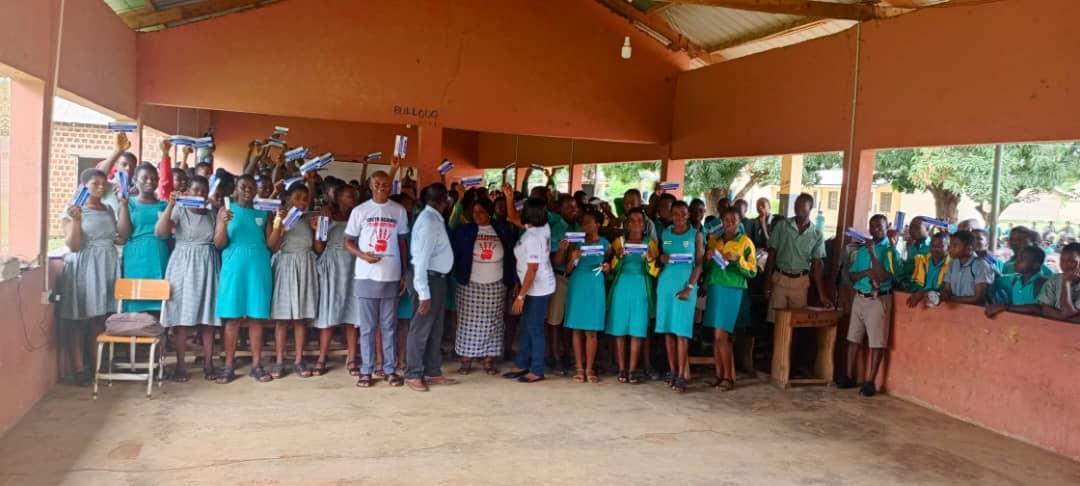Africa-Press – Ghana. The Ghana Anti-Corruption Coalition (GACC) has appealed to students to actively stand against corruption in all its various forms.
Recognising the unique position of youth in both experiencing and combating corruption, the GACC aims to empower them with knowledge and tools necessary for promoting integrity and demanding accountability.
During an event to commemorate African Union Anti-Corruption Day at Okadjakrom Senior High Technical School in the Jasikan Municipality of the Oti Region, Madam Comfort Tsaku, the Kadjebi Chairperson of the Local Accountability Network (LANet) emphasised the organisation’s commitment to engaging the youth in anti-corruption initiatives.
She that would be done by fostering a sense of responsibility among young people; the GACC seeks to equip them to resist corrupt practices and serve as future leaders.
Madam Tsaku, who read the General Secretary of the Ghana Anti-Corruption Coalition’s address, said since 2018, the GACC had prioritised outreach and educational efforts, targeting young individuals.
She mentioned that in 2024 alone, the coalition reached out to 27,667 youths across 33 districts in 14 regions, addressing crucial topics such as electoral corruption, whistleblowing, and enhancing youth participation in governance.
These activities are conducted in collaboration with key partners, including the National Commission for Civic Education (NCCE), the Commission on Human Rights and Administrative Justice (CHRAJ), and the Office of the Special Prosecutor (OSP).
Madam Tsaku reiterated the GACC’s ongoing commitment to creating a corruption-free environment and encouraging students to play a proactive role in this important fight.
During the African Union Anti-Corruption Day celebrations, the LANet Chairperson highlighted that the GACC, with the support of the Hewlett Foundation, is expanding its sensitisation efforts.
This year, the initiative aims to engage youth across 40 districts in 16 regions, focusing on empowering them to take action against corruption.
The programme emphasised the importance of promoting whistleblowing, raising awareness about the detrimental impacts of corruption, and encouraging active citizenship among young people.
Mr. Richard Dake, the District Personnel Officer at the Kadjebi District Directorate of the Ghana Education Service (GES), urged students to avoid engaging in corrupt activities, which he outlined as violations of fundamental human rights.
He pointed out various forms of corruption, including bribery, embezzlement, fraud, extortion, nepotism, cronyism and favouritism, emphasising that these undermine social well-being.
In a presentation titled: “Whistleblowing and the Role of the Youth”, Mr. Dake discussed the complexity of issues related to corruption, public accountability, and transparency.
He noted that addressing these challenges requires collaborative efforts from all sectors of society, as corruption has become endemic in Ghana, impacting various aspects of life and disproportionately affecting the poor and vulnerable.
He called for a comprehensive approach including public education institutions, civil society organisations, and local government structures to educate citizens about corruption and its far-reaching effects.
Madam Emma Asilevi, a member of LANet, reinforced the message by urging students to engage in a holistic fight against corruption, characterizing it as an insidious plague with corrosive effects on societies.
She reflected on Ghana’s complicated history with corruption, noting that despite efforts under both civilian and military regimes, corruption continues to be a pervasive issue in the country.
Madam Asilevi, the Girls’ Education Officer at the Kadjebi District Director of the GES, urged citizens to actively resist and report corrupt activities, emphasising the importance of accountability.
To facilitate this, she named CHRAJ, OSP, the Police, the Economic and Organised Crime Office (EOCO), among others where individuals can report corruption.
Mr. Joseph Ofori-Addey, the Assistant Headmaster in-charge of Academic at Okadjakrom Senior High Technical School, praised the educational team for their insightful presentations on corruption and its various dimensions.
The event included a comprehensive discussion on numerous topics, such as the forms and effects of corruption, the Whistleblowing Act, 2006 (Act 720), the Witness Protection Act, and the essential role of youth in these efforts.
In addition to the educational programme, students from Kadjebi Girls’ Model Junior High School (JHS), Kadjebi R.C JHS, Kadjebi D/A “A” JHS, Kadjebi E.P Central JHS, and Kadjebi E.P JHS participated in a float march through the principal streets of Kadjebi.
This procession was part of the commemoration of African Union Anti-Corruption Day.
Observed annually on July 11, the African Union Anti-Corruption Day highlights the continent’s commitment to combating corruption, aligned with the 2003 AU Convention.
The day serves as a reminder to reflect on progress made, raise awareness, and reinforce efforts in the fight against corruption.
This year’s theme: “Justice for Africans and People of African Descent through Reparation”, underscores a broader commitment to justice and accountability across the continent. GNA
For More News And Analysis About Ghana Follow Africa-Press







